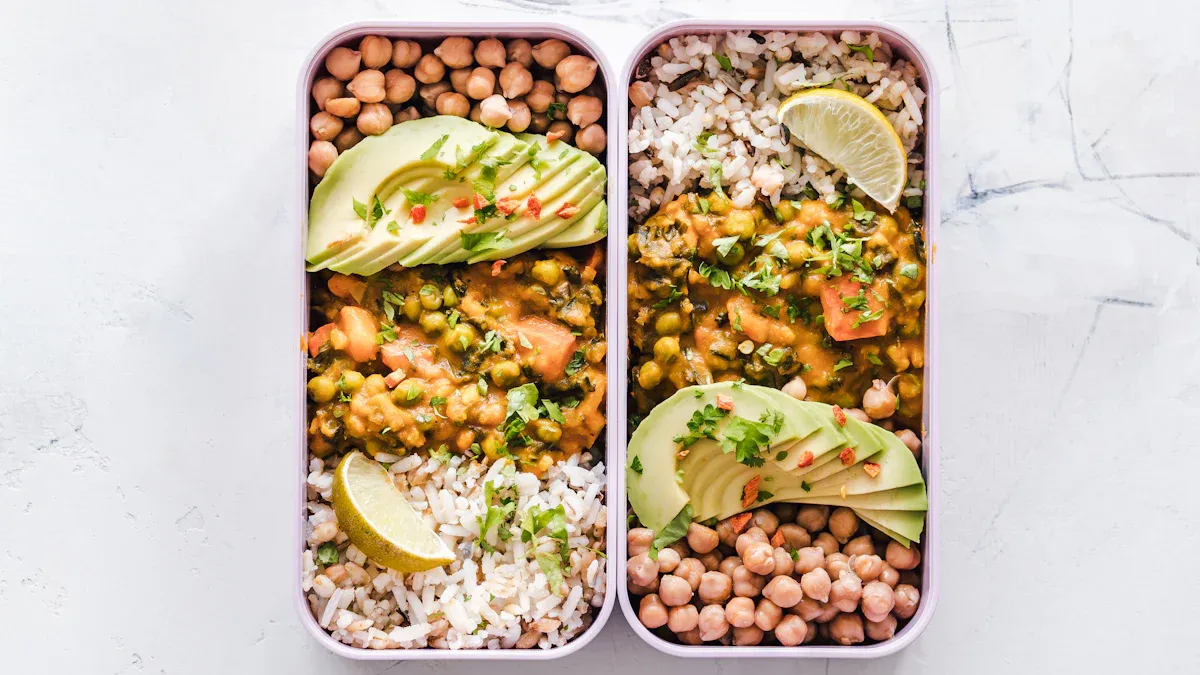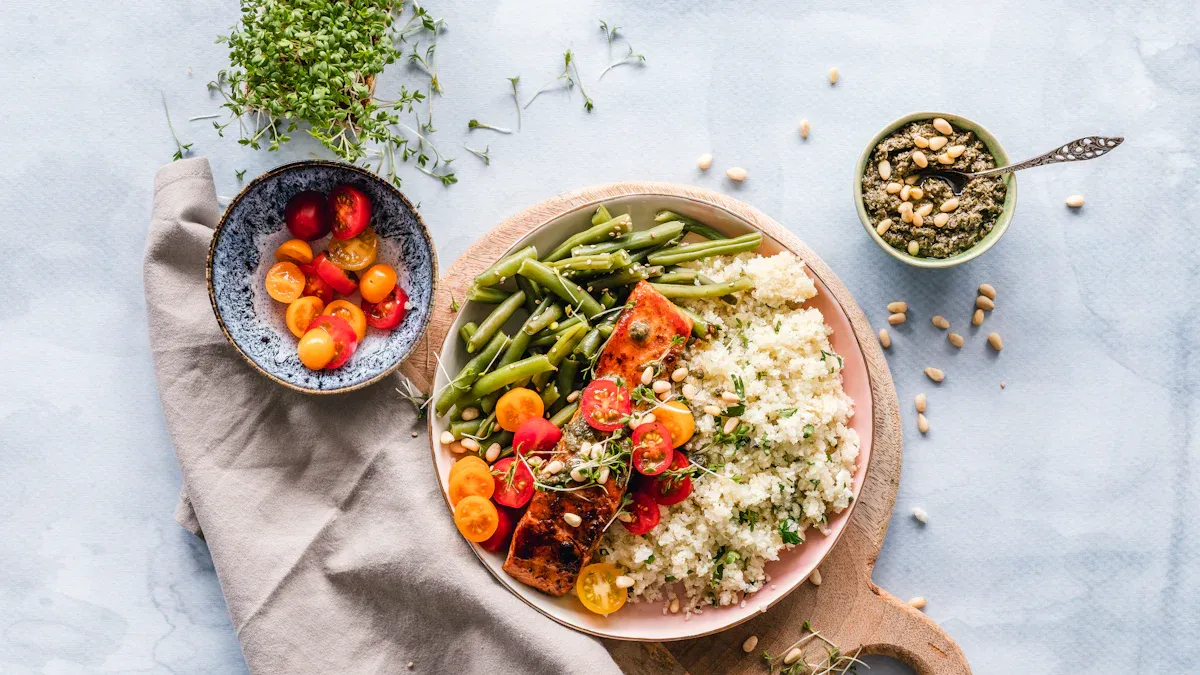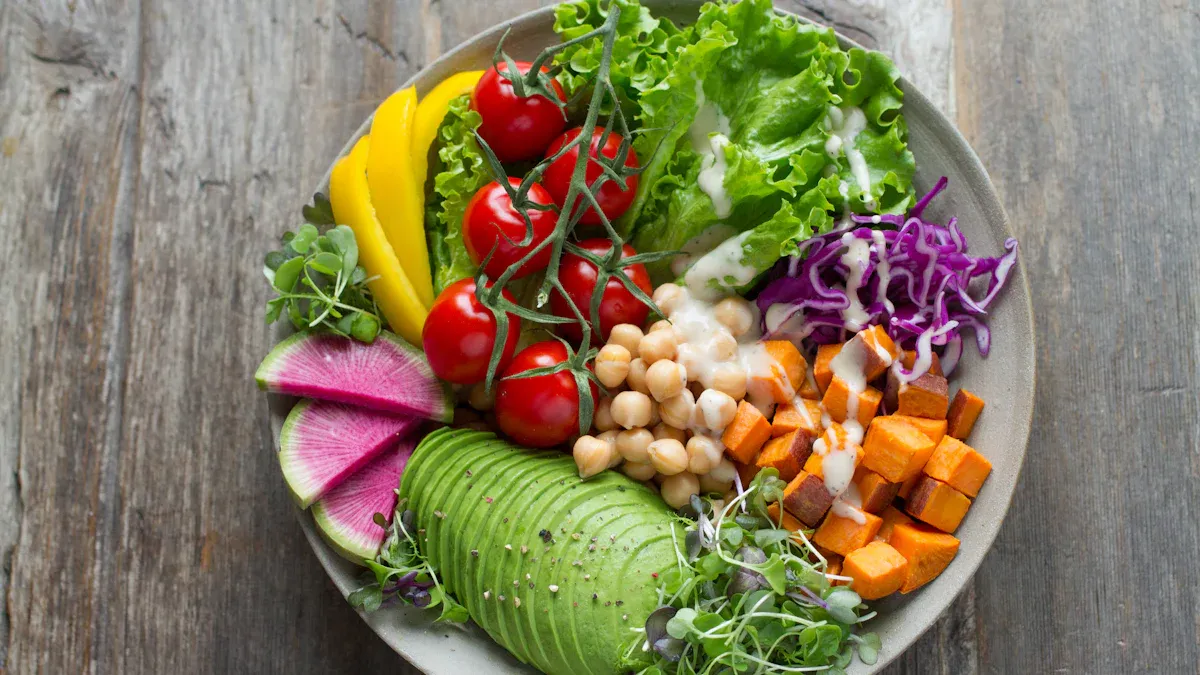How to Build a Balanced Meal Plan for Cancer Prevention

Your daily food choices can shape your long-term health. Balanced nutrition plays a critical role in reducing cancer risk. Research shows that diet and nutrition contribute to 20–25% of the global cancer burden. High-calorie diets and inactivity add another 10–15%. Even small changes, like eating more whole grains or cutting back on red meat, can make a difference. By creating a balanced meal plan for cancer prevention, you empower yourself to take control of your health. Start today by choosing nutrient-rich foods that nourish your body and protect it from harm.
Key Takeaways
Pick healthy foods like fruits, veggies, and whole grains. These can lower cancer risk and improve your health.
Eat less processed and red meat since they may raise cancer risk. Choose better protein options instead.
Use the two-thirds plant-based rule to get enough nutrients.
Plan meals early to save time and eat healthier. Cooking in batches can make this easier.
Talk to a dietitian for meal plans that fit your needs. This can help you eat better and stay healthy.
Understanding Cancer-Preventive Nutrition
Nutrient-Dense Foods and Their Benefits
Nutrient-dense foods are your best allies in the fight against cancer. These foods pack essential vitamins, minerals, and antioxidants into every bite, helping your body stay strong and resilient. For example, dietary fiber reduces the risk of colorectal cancer, while omega-3 fatty acids have anti-inflammatory properties that may lower cancer risk. Vitamin C plays a role in preventing cancer cell growth, and protein supports overall health.
Here’s a quick look at how specific nutrients contribute to cancer prevention:
Nutrient | Benefit |
|---|---|
Protein | Supports overall health and may reduce cancer risk |
Omega-3 Fatty Acids | Anti-inflammatory properties |
Dietary Fiber | |
Vitamin C | Prevents cancer cell growth |
By including these nutrient-rich foods in your meals, you take a proactive step toward creating a balanced meal plan for cancer prevention.
The Impact of Food Choices on Cancer Risk
Your daily food choices directly influence your cancer risk. Diets high in processed meats and ultra-processed foods increase the likelihood of developing colorectal, colon, and breast cancers. Alcohol consumption is another major risk factor, linked to cancers of the liver, breast, and colon. On the other hand, diets rich in fruits, vegetables, and whole grains are associated with a lower risk of several cancers, including renal cell carcinoma and bladder cancer.
Food/Nutrient | Cancer Association |
|---|---|
Alcohol | Increased risk of breast, colorectal, and liver cancer |
Dairy Products | Inversely associated with colorectal cancer risk |
Coffee | Linked to reduced liver cancer risk |
By making thoughtful food choices, you can significantly reduce your cancer risk and improve your overall health.
Achieving Balance and Variety in Your Diet
Balance and variety are key to a cancer-preventive diet. Eating a wide range of foods ensures you get all the nutrients your body needs. For example, the Mediterranean diet, which emphasizes fruits, vegetables, whole grains, and healthy fats, is linked to a 29% reduction in gastric cancer risk. Similarly, the DASH diet, rich in plant-based foods, is inversely associated with lung cancer risk.
Dietary Pattern | Cancer Association |
|---|---|
Mediterranean Diet | 29% reduction in gastric cancer risk |
DASH Diet | Lower lung cancer risk |
To create a balanced meal plan for cancer prevention, aim to fill your plate with two-thirds plant-based foods and one-third lean proteins. Rotate seasonal ingredients and experiment with new recipes to keep your meals exciting and nutritious. Small, consistent changes can lead to big health benefits over time.
Key Foods to Include in a Balanced Meal Plan

Antioxidant-Rich Fruits and Vegetables
Examples of Colorful Produce
Adding a rainbow of fruits and vegetables to your meals can supercharge your diet with cancer-fighting nutrients. Vibrant options like tomatoes, carrots, mangoes, and grapes are rich in antioxidants that protect your cells from damage. Green leafy vegetables, such as spinach and kale, provide essential vitamins and minerals. Lemons and figs offer additional protective benefits, while cucumbers and celery keep you hydrated and nourished.
Benefits | |
|---|---|
Tomatoes | Vitamins and antioxidants |
Carrots | Nutrients and antioxidants |
Mangoes | Enzymes and coenzymes |
Grapes | Vitamins and minerals |
Green leafy vegetables | Essential nutrients |
Lemons | Antioxidants with protective effects |
Cucumbers | Hydration and vitamins |
Celery | Hydration and nutrients |
By including these colorful foods in your meals, you create a balanced meal plan for cancer prevention that is both nutritious and delicious.
Benefits of Cruciferous Vegetables
Cruciferous vegetables like broccoli, cauliflower, and Brussels sprouts are nutritional powerhouses. They contain compounds called glucosinolates, which may help reduce cancer risk by protecting cells from DNA damage. These vegetables also support your body’s detoxification processes, making them an essential part of your diet.
Whole Grains and High-Fiber Foods
Types of Whole Grains to Include
Whole grains like quinoa, brown rice, and sprouted wheat are excellent sources of fiber and essential nutrients. Sprouted grains, in particular, offer enhanced nutritional benefits. Incorporating these grains into your meals can help you feel full longer and maintain a healthy weight, a key factor in cancer prevention.
Role of Fiber in Cancer Prevention
Fiber plays a crucial role in reducing cancer risk, especially for colorectal cancer. It promotes healthy digestion and supports beneficial gut bacteria. Foods like dates, figs, and whole grains are high in fiber and should be staples in your diet.
Healthy Fats and Plant-Based Proteins
Sources of Omega-3 Fatty Acids
Healthy fats, such as those found in olive oil and raw almonds, are essential for your body. Omega-3 fatty acids, found in flaxseeds and walnuts, have anti-inflammatory properties and may help prevent cancer.
Benefits of Nuts, Seeds, and Legumes
Nuts, seeds, and legumes are rich in protein, fiber, and healthy fats. They are low in energy density, making them ideal for weight management. Including foods like chickpeas, lentils, and sunflower seeds in your meals can provide protective effects against cancer while keeping your diet satisfying and varied.
Tip: A plant-based diet rich in fruits, vegetables, whole grains, and healthy fats can significantly reduce your cancer risk. Start small by adding one or two of these foods to your meals each day.
Foods to Limit or Avoid for Cancer Prevention

Processed Meats and Red Meats
Why They Pose a Risk
Processed and red meats have been linked to an increased risk of several cancers. Studies show that high consumption of red meat raises the likelihood of developing colorectal, breast, and lung cancers. Processed meats, such as bacon, sausages, and deli meats, are even more harmful. They are associated with an 18% higher risk of colorectal cancer and a 21% increase in colon cancer risk. These meats often contain preservatives and additives like nitrates, which can form carcinogenic compounds during digestion.
Did you know? Eating just 50 grams of processed meat daily—about two slices of bacon—can increase your colorectal cancer risk by 18%.
Healthier Protein Alternatives
You can reduce your cancer risk by swapping red and processed meats for healthier protein sources. Consider incorporating:
Plant-based proteins: Lentils, chickpeas, and tofu.
Fish and seafood: Rich in omega-3 fatty acids.
Poultry: A leaner alternative to red meat.
These options not only lower cancer risk but also provide essential nutrients for overall health.
Sugary Drinks and Refined Carbohydrates
Impact on Inflammation and Weight
Sugary drinks and refined carbohydrates contribute to chronic inflammation and weight gain, both of which are linked to cancer. Research highlights the dangers of excessive sugar consumption:
Women consuming one or more sugar-sweetened beverages daily face an 85% higher risk of liver cancer.
Long-term studies reveal that sugary drinks increase the risk of premature death, particularly from cancer and cardiovascular disease.
Refined carbohydrates, such as white bread and pastries, cause rapid blood sugar spikes, promoting inflammation and potentially fueling cancer cell growth.
Healthier Beverage Choices
You can make simple swaps to reduce your sugar intake:
Replace soda with sparkling water or unsweetened herbal tea.
Choose whole fruits over fruit juices for natural sweetness and fiber.
Opt for black coffee or green tea, both linked to reduced cancer risks.
Alcohol Consumption
Recommended Limits
Alcohol is a known carcinogen, increasing the risk of cancers like breast, liver, and esophageal. Each 10 grams of alcohol consumed daily raises cancer risk by 4-25%. To minimize harm, follow these guidelines:
Limit alcohol to 1 drink per day for women and 2 drinks per day for men.
Avoid heavy drinking, defined as 4+ drinks for women or 5+ drinks for men in a single day.
Tip: If you don’t drink alcohol, there’s no need to start. Even moderate drinking carries risks.
Strategies for Reducing Intake
Cutting back on alcohol can feel challenging, but small changes make a big difference:
Set a weekly limit and track your consumption.
Replace alcoholic beverages with mocktails or sparkling water.
Focus on social activities that don’t revolve around drinking.
By limiting these foods and drinks, you take a powerful step toward reducing your cancer risk and improving your overall well-being.
Practical Tips for Creating a Balanced Meal Plan
Portion Control and Plate Composition
Using the Two-Thirds Plant-Based Rule
A simple way to create a cancer-preventive meal is by following the two-thirds plant-based rule. Fill two-thirds of your plate with vegetables, fruits, whole grains, and legumes. The remaining one-third can include lean proteins like fish or poultry. This approach ensures your meals are rich in fiber, antioxidants, and essential nutrients. For example, pairing roasted vegetables and quinoa with grilled salmon creates a balanced and satisfying dish.
Tip: Keep a variety of colorful produce on hand to make your plate visually appealing and nutrient-dense.
Managing Portion Sizes Effectively
Portion control plays a vital role in maintaining a healthy weight, which is crucial for cancer prevention. Use smaller plates to avoid overeating and measure servings when possible. For instance, a serving of cooked grains should be about half a cup, while a portion of lean protein is roughly the size of your palm. Eating slowly and savoring each bite can also help you recognize when you're full.
Meal Prep and Planning Strategies
Benefits of Weekly Meal Planning
Planning your meals in advance saves time and ensures you stick to a balanced diet. Studies show that a plant-based diet, when followed consistently, lowers the risk of chronic diseases, including cancer. By dedicating a few hours each week to meal prep, you can create nutritious meals that align with your health goals.
Tips for Batch Cooking and Shopping Lists
Batch cooking is a game-changer for busy weeks. Prepare large portions of soups, stews, or roasted vegetables and store them in individual containers. This method not only saves time but also reduces the temptation to opt for less healthy options. A well-organized shopping list can further streamline the process. Include staples like whole grains, leafy greens, and nuts to ensure your pantry is stocked with cancer-fighting ingredients.
Adding Variety and Enjoyment to Your Diet
Rotating Seasonal Ingredients
Eating seasonally adds freshness and variety to your meals. Seasonal produce is often more flavorful and nutrient-rich. For example, enjoy berries in the summer and root vegetables in the winter. Rotating ingredients keeps your meals exciting and ensures you benefit from a wide range of nutrients.
Experimenting with New Recipes
Trying new recipes can make healthy eating more enjoyable. Incorporate antioxidant-rich foods like dried fruits, oily fish, and legumes into your dishes. Research shows that diets high in antioxidants reduce the risk of cancers like head and neck cancer. View your diet as an opportunity to explore global cuisines and discover new flavors.
Note: A diet that feels restrictive can be hard to maintain. Focus on the positive impact of your food choices rather than viewing them as limitations.
Customizing Your Balanced Meal Plan
Adapting to Personal Needs and Preferences
Addressing Allergies and Dietary Restrictions
Your meal plan should reflect your unique health needs and dietary restrictions. If you have allergies or intolerances, such as gluten or dairy sensitivities, it’s essential to find alternatives that still provide the nutrients your body needs. For example, almond milk or oat milk can replace dairy, while quinoa or rice can substitute for wheat-based grains. Personalized meal planning becomes even more critical during cancer care. Tailored diets can help reduce treatment side effects and improve your overall quality of life.
Research highlights the importance of addressing dietary restrictions in cancer prevention and care. While some patients believe specific diets can target cancer, the evidence supporting these claims remains limited. However, maintaining adequate nutrition through a customized approach can enhance health outcomes and support your body’s resilience.
Tailoring Meals to Individual Tastes
Healthy eating doesn’t have to feel restrictive. By tailoring your meals to your personal tastes, you can enjoy the process of nourishing your body. If you dislike certain vegetables, experiment with different cooking methods or seasonings to make them more appealing. Love spicy food? Add cancer-fighting spices like turmeric or ginger to your dishes. A decade of research shows that analyzing dietary patterns, rather than focusing on individual nutrients, provides stronger associations with cancer prevention. This means you can create a meal plan that’s both effective and enjoyable by focusing on the foods you love within a balanced framework.
Seeking Professional Guidance
Consulting a Dietitian or Nutritionist
Working with a dietitian or nutritionist can transform your approach to cancer-preventive eating. These professionals can assess your health needs and create a personalized plan that aligns with your goals. Studies show that dietitian-led interventions significantly improve nutrition outcomes compared to standard care. For example, a randomized controlled trial revealed that patients receiving dietitian support experienced better nutrition assessments within nine weeks and improved survival rates.
Study Type | Intervention | Median Overall Survival | Nutrition Assessment Improvement |
|---|---|---|---|
Randomized Controlled Trial | 14.8 months | Significant improvement at 9 weeks | |
Standard Care | Medical oncologist and oncology nurse only | 11.9 months | N/A |
Importance of Regular Health Check-Ups
Regular health check-ups play a vital role in cancer prevention. These visits allow you to monitor your progress and adjust your meal plan as needed. A dietitian can help you stay on track, while your healthcare provider can identify any early warning signs of nutritional deficiencies or health concerns. By combining professional guidance with your personalized meal plan, you can take proactive steps toward a healthier, cancer-preventive lifestyle.
Tip: Don’t hesitate to seek expert advice. A small investment in professional guidance can lead to significant long-term health benefits.
Balanced nutrition is a powerful tool in your journey toward cancer prevention. A diet rich in plant-based foods, whole grains, and healthy fats can significantly lower your risk of various cancers, including breast, prostate, and colorectal cancers. On the other hand, diets heavy in fatty meats increase colorectal cancer risk.
Dietary Factor | Cancer Risk Reduction | Source |
|---|---|---|
Plant-based diet | Lower risk of breast, prostate, colorectal, and lung cancer | [6,7,41,42] |
Fatty meat-heavy diet | Higher risk of colorectal cancer | [43] |
Nutrient-rich diet | Essential for overall health and cancer risk reduction | [7,71] |
Key nutrients (e.g., omega-3, vitamins) | Protective against cancer | [7,72,73] |
Small, consistent changes, like adding more vegetables to your plate or swapping sugary drinks for water, can make a big difference. Start today by making one healthier choice. Each step brings you closer to a stronger, healthier future. 🌟
Remember: Your food choices matter. Every meal is an opportunity to protect your health and thrive.
FAQ
What is the best way to start a cancer-preventive diet?
Start small. Add more fruits, vegetables, and whole grains to your meals. Replace processed snacks with nuts or seeds. Gradually reduce red meat and sugary drinks. Focus on consistency rather than perfection. Every healthy choice you make strengthens your body and reduces your cancer risk. 🌟
Can I still enjoy desserts while following a cancer-preventive meal plan?
Absolutely! Choose healthier options like fresh fruit, dark chocolate, or homemade treats with natural sweeteners. Moderation is key. Satisfy your sweet tooth without compromising your health goals. You can enjoy desserts while staying on track with your balanced meal plan.
How can I make meal prep easier for a busy schedule?
Batch cooking is your best friend. Prepare large portions of soups, grains, or roasted vegetables. Store them in individual containers for quick meals. Use a shopping list to stay organized. With a little planning, you can save time and stick to your cancer-preventive diet.
Are plant-based diets the only option for cancer prevention?
Not at all! While plant-based diets are highly beneficial, you can still include lean proteins like fish or poultry. The key is balance. Focus on filling two-thirds of your plate with plant-based foods and enjoy other healthy options in moderation.
How do I know if my meal plan is effective?
Pay attention to how you feel. Increased energy, better digestion, and maintaining a healthy weight are great signs. Regular health check-ups and consultations with a dietitian can also help you track your progress and make adjustments as needed.
Tip: Celebrate small wins. Every step toward healthier eating is a step toward a stronger, healthier you!
See Also
An In-Depth Overview of Various Cancer Types
Recognizing Duodenal Cancer: Symptoms and Available Treatments
Gastrinoma: Essential Symptoms and Important Information
Cholangiocarcinoma: Key Features and Understanding Its Impact

